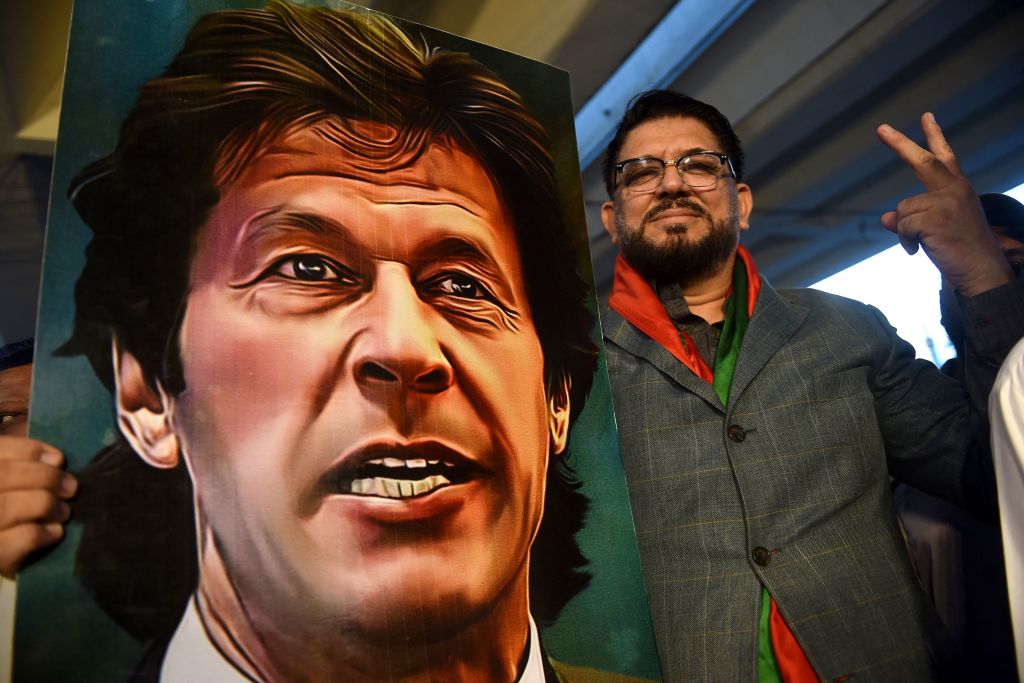
Pakistan’s politics were plenty toxic even before the failed assassination against ousted former Prime Minister Imran Khan. When Khan was removed from power following a parliamentary vote of no confidence in April, he claimed Pakistan’s military and its friends in Washington wanted to silence him. He then kicked off a series of protest marches that have drawn massive crowds.
In October, Khan insinuated that the army had killed a journalist, an uncharacteristically blunt frontal assault on Pakistan’s army, and the country’s head of military intelligence felt compelled to call an unprecedented public press conference to deny the charge. Officials in the current government, led by Shehbaz Sharif, accused Khan of terrorism, illegally receiving money from foreigners, and other forms of financial fraud. Then, during a protest rally earlier this month, Khan was shot in the leg, some of his supporters were wounded, and one was killed.
It’s all part of a three-way fight between Pakistan’s current government, its powerful and politically meddlesome military, and Khan, a former cricket star and playboy who governed as a supporter of Muslim fundamentalism. Khan blamed the attempt to kill him on Prime Minister Sharif, the Interior Minister, and a senior military officer. If some Pakistanis who doubted past charges of conspiracy find them more plausible now that shots have been fired, critics within the government have accused Khan of staging the shooting to discredit Sharif and win sympathy.
The suspected gunman provided conflicting accounts of his own motives before finally settling on “blasphemy” as Khan’s unpardonable offense. Khan himself claims there was more than one shooter. The government and military are dragging their feet on launching a formal investigation. Even with one, the mysteries surrounding this event are unlikely ever to be solved, and each side will believe the version of events it chooses to credit.
The political temperature continues to rise. Since Oct. 28, the still popular Khan has led what he’s billed as another “Long March” across the country toward Islamabad, the capital, to protest his ouster as Prime Minister and to demand early elections, which he says would restore him to power with a large popular mandate to clean up corruption and uproot a deep-state-style conspiracy to keep power in a very few hands. He is popular enough that his rivals and enemies have no intention of giving him that opportunity. The government is not required to hold elections until October 2023.
Khan’s challenges and this latest political intrigue will only make it harder for Sharif’s government to manage an economy in deep trouble. Decades of waste and corruption have taken a cumulative toll, and Khan’s populist economic policies as Prime Minister only added to the IOUs of a country that was already billions in debt, particularly to China. Recent floods that killed almost 1,500 people and impacted millions of lives have inflicted tens of billions of dollars in damage. Inflation has reached historic heights. Current Prime Minister Sharif has worked hard to win a $7 billion relief package from the International Monetary Fund, which would require Pakistan to, among other things, cut state subsidies to help Pakistanis pay their soaring energy bills. An austerity budget and more spending cuts are badly needed to bring Pakistan’s books a bit closer to balance, but Khan, seeing an unmissable opportunity to attack the government, has denounced the cuts. He claims, implausibly, that if he becomes Prime Minister again, the cuts won’t be needed.
A confrontation is coming. Once his leg has sufficiently healed, Khan will rejoin thousands of his supporters and continue their march toward Islamabad. Men holding guns will be waiting, and no one is likely to back down.
More Must-Reads From TIME
- The 100 Most Influential People of 2024
- The Revolution of Yulia Navalnaya
- 6 Compliments That Land Every Time
- What's the Deal With the Bitcoin Halving?
- If You're Dating Right Now , You're Brave: Column
- The AI That Could Heal a Divided Internet
- Fallout Is a Brilliant Model for the Future of Video Game Adaptations
- Want Weekly Recs on What to Watch, Read, and More? Sign Up for Worth Your Time
Contact us at letters@time.com